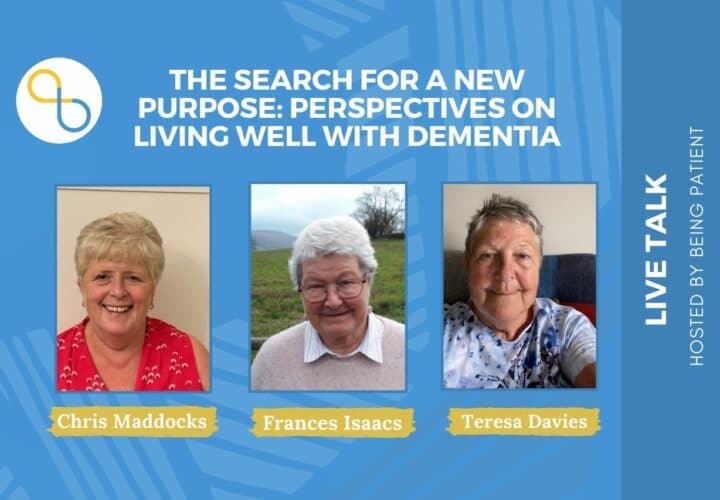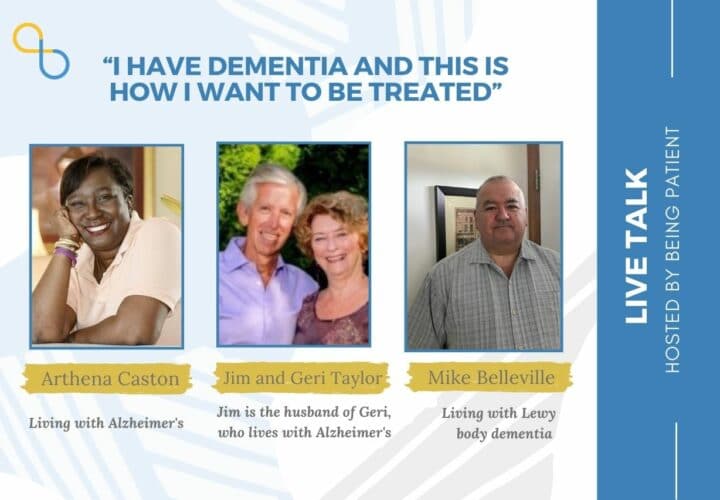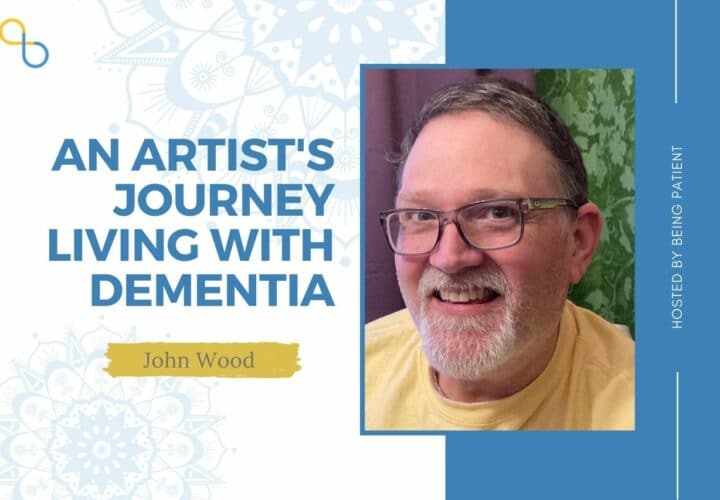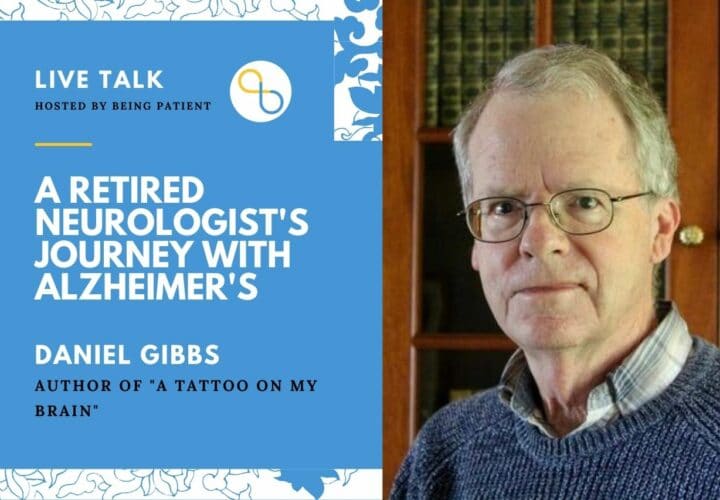Chris Maddocks, Frances Isaacs and Teresa Davies share the challenges they have faced following their dementia diagnoses, and the bonds they have formed with others on a similar path — the friendships that have become the touchstones of their journeys with dementia.
A dementia diagnosis puts into question people’s sense of personhood — what it means to be a person — in recognition that their ability to live independently will decline over time. It upturns careers, relationships and life plans, but not all is lost in this new chapter of life as it can also bring about new opportunities and relationships.
The sense of humanity isn’t solely defined by memories, and the ability to remember isn’t a prerequisite for experiencing the depths of human emotions — the joy and love, the sadness and grief that compose the meaning of being human.
Being Patient spoke with Chris Maddocks, Frances Isaacs and Teresa Davies (Dori) about their experience coping with their dementia diagnoses, what brings fulfillment in their lives and the importance of their newfound friendships after a diagnosis.
Being Patient: Teresa, you were first diagnosed with early-onset Alzheimer’s and later received an additional diagnosis vascular dementia. What were the main challenges that you faced following your initial diagnosis?
Teresa Davies: The biggest challenge was other [people’s] response to me once they knew I had dementia. The way they interacted with me [was like] I suddenly wasn’t myself. They were all doing [things] for me and telling me all the things I can’t do anymore. [The] biggest challenge was saying, ‘I’m still me. Don’t treat me any differently to what you treated me before my diagnosis.’
I know it’s only because they care. My daughter — we’ve always been close — always used to come to me with her troubles. [She] stopped doing that. I could tell there were things on her mind. I also used to have my granddaughter for sleepovers, and all of a sudden, that stopped. There were excuses made. It came to light then that my daughter thought it was too much for me, that I wouldn’t be able to cope now I’ve got dementia, and also she didn’t want to worry me with her troubles.
When I was diagnosed, I felt I was stripped as a person. I said [to my daughter], ‘Don’t strip me of being a mom, and don’t strip me of being a grandmother. I’m still your mom. I’m still a grandmother.’ Anyway, she does tell me all her troubles now. But it’s all the people’s reactions: Friends disappear or you go to the doctors’ [office] and people talk to her, so you feel like you’re invisible. They don’t talk to you.
Being Patient: Chris, like Teresa, you were diagnosed with mixed dementias: First with early-onset vascular dementia, then Parkinson’s and Lewy body dementia. What were your main obstacles after receiving your first diagnosis?
Chris Maddocks: I was 60 when I had my diagnosis and I’ve watched my dad living through Alzheimer’s. I knew what he had gone through and I thought that was my future. The biggest problem was that I thought I was going mad because I was doing things like, one morning I got up and I couldn’t remember how to get dressed, and I couldn’t remember if I had taken [my medications] or not.
In one respect, it came as a little bit of a relief to know that there was a reason for these things and that I wasn’t going mad. But when I had my diagnosis, that was it: ‘This is what you have: You have vascular dementia. Go and get your affairs in order and put your life in order.’ We want to hear [about] things that we can still do, not to be told, ‘This is the end of your life effectively.’ That’s what it felt like, and I felt like I’d been given a death sentence when I had my diagnosis. I lost friends because they didn’t understand that I’m still me. I’m still Chris. It’s just that my brain works slightly more slowly.
When I tried to go back to work, they didn’t know what to do with me, and they put me on a disciplinary process, which was totally wrong. Long story short, within three months of my diagnosis, I was ill-health retired from my job. I was told that they were going to dismiss me and I said, ‘I’d never been dismissed from my job, so no you’re not.’ So, their ill-health retired me.
It was an awful lot to deal with. I cried for three months and I didn’t leave the house. I then went into anxiety and depression. It was because my diagnosis wasn’t handled well, and that they should have made reasonable adjustments in my workplace so that I could have stayed in work. Not only do you get this life-changing diagnosis, but you lose your financial earnings as well. You’ve got to come to terms with it, and it probably took me at least six months to try and come to terms with the fact that I did have dementia.
“The three of us on this call today, we like to
help other people, and we can still do that. We still
got an awful lot to give. The medical health
professional should try and help us to see that.”
I was fortunate because [I went to a course that was run by the Alzheimer Society in the U.K.] and I realized I wasn’t the only person who was feeling certain things or being affected in certain ways, that other people are the same. That was quite a lifeline to me, because I just felt useless and hopeless when I had my diagnosis, and I lost all sense of purpose in my life.
I suddenly thought, I can either sit and watch daytime television every day and vegetate or I can still do something with my life. I decided I would still do something with my life. I started just talking and sharing my story, and I was told that I was very good at putting my story across. A lot of people are ashamed to speak about their dementia, but I thought if I don’t speak about it, how can I raise awareness?
Being Patient: How about yourself Frances? What were the challenges that you faced after a diagnosis of posterior cortical atrophy?
Frances Isaacs: I didn’t quite believe it. I just thought it was everyone else around me [acting differently], but then I’ve always been a bit of an off-the-wall character as Chris and Dori well know. The diagnosis was a wake up call, but I was very lucky because where I live, they gave me brilliant advice. They said, ‘Tell everyone that you have dealings with and then there’ll be more understanding.’
“I’m still me, with a few bits that are
missing — that’s all it is, and I’ve learned to live
with it, mainly through becoming friends with the likes
of Dori and Chris because we all understand each other.”
Yes, there was a certain amount of stigma, and yes, a few friends started to leave me out of things a bit, but would you regard them as real friends if they did that to you? No. I’m maybe cooler with them now, or don’t bother with them, because they look at you and they think, ‘Not quite a real person anymore, are you? So you’re not worth talking to.’
But, I’m still me. I’m still me, with a few bits that are missing — that’s all it is, and I’ve learned to live with it, mainly through becoming friends with the likes of Dori and Chris because we all understand each other. Through lockdown, I’ve had the company of these two and other friends. We see each other perhaps once or twice a week on Zoom calls, and it’s been my lifesaver. It’s just made life pretty fantastic for me. I don’t have a fabulous lot to moan and complain about.
Chris Maddocks: I just want to say something about Frances because she won’t say it herself. Frances is a wonderful artist. During lockdown, Frances has been teaching other people living with dementia how to paint in watercolor. She’s made such a huge difference to so many people’s lives because it’s given us that sense of purpose, and she’s a very good teacher.
Frances Isaacs: That’s very kind of you, Chris. And no, I wasn’t actually going to mention it.
Being Patient: The three of you are all involved in a network of people living with dementia called the Dementia Engagement and Empowerment Project (DEEP). How important has DEEP been to your lives?
Frances Isaacs: [A person at DEEP] talked about the dementia diaries. They were oral diaries made by lots of different people from many walks of life all talking about how they were feeling: good, bad, indifferent, euphoric, the gamut of feelings you can imagine. She asked me to make a diary, so I did. I had started to listen to other people’s [diaries], and it’s from listening to other people that I realized there’s a life out there. I’m not ready to give in and be defined by this. I need to get on and lead my life. It was by being involved with that that I was drawn in more and more.
Chris Maddocks: [DEEP] is for people living with dementia, but it’s run by people living with dementia. It’s one big peer support group. We haven’t got people telling us what to do. We decide what we’d like to do, and then we get on and do it with support and help. Our voices are heard.
Teresa Davies: [I was put in touch] with Rachel Niblock from the DEEP network. Rachel phoned me up and asked would I like to go along to do this talk in Cardiff. I was a landscape gardener before. I’d never done public speaking. I was quite shy and I said, ‘Oh God, no.’ Anyway, I went along and I’m so glad I’ve met all these other lovely [people] and they all give me confidence.
“Dementia’s given me wings. It’s given me
permission to be me. Obviously you don’t wish to have
dementia, but I’m just happy to be breathing and I
want to help other people know that it’s not the end of your life.”
Somebody asked me, ‘What’s the best decade of your life?’ I said, ‘My 60s.’ He said, ‘But you’ve got dementia [in] your 60s.” I said, ‘Yes, and I’m happier now than I’ve ever been.’
Dementia’s given me wings. It’s given me permission to be me. Obviously you don’t wish to have dementia, but I’m just happy to be breathing and I want to help other people know that it’s not the end of your life.
Chris Maddocks: We’ve met friends that we would never have met if we didn’t have dementia. We’ve got a lovely group of friends. The three of us here and some other women through the DEEP network meet on Zoom. It’s a safe place for us. We got to know each other very well when [meeting] over on our weekly Zooms. We laugh together and we cry together and we’re there for each other.
“We laugh together and we cry together
and we’re there for each other.”
Peer support, in whatever way is best to for you as an individual, is the key thing. We do understand each other because we’ve got dementia. Sometimes, with your partners, your husbands, your wives, your friends, they don’t understand what you’re going through in quite the same way. Other people living with dementia get it far better. We give each other advice and we give each other solutions. We’ve just got such good, firm friends, and if we didn’t have dementia, we wouldn’t be friends together.
Being Patient: What would your message be for healthcare providers to provide better care for patients with dementia?
Frances Isaacs: A little less condescension and a lot more kindness. You don’t go from being you one day to being a complete lunatic the next day. [Dementia is] incremental. It’s very slow, but nobody tells you that.
We all know what end-of-life, dementia patients look like. You think that’s your next step and it could be tomorrow. So, you run around like a maniac: Certainly I did, getting my stuff in order, trying to tidy up so the children wouldn’t have to be bothered with all my rubbish that I keep.
Teresa Davies: The professionals should hand out hope and provide more information of the symptoms, that it’s not just memory [symptoms]. They give you all these leaflets. But [the leaflets should be in] more layman’s terms. [And, the professionals should offer] continuity as well. They send some people out to see you, and then they disappear. Memory clinics need to put you in touch with other people who’ve got dementia.
I’ve been discharged from the memory clinic, and referred back to my GP (general practitioner), who hasn’t got a clue about anything about dementia.
Chris Maddocks: See the person and not the dementia would be my first tip. I’ve been to hospital appointments with my partner, and it’s a case of, they don’t talk to me. They talk to the person that you’re with. Now I say, ‘Excuse me, but you’re talking about me, so would you talk to me? I can still understand what you’re saying.’
Look at the things that we can still do. All of us have heard, ‘You’ve got dementia, you can’t learn new things.’ But actually, we can, and we’ve proven this by doing Frances’ watercolor courses. Give us things that we can do, and with young-onset dementia, we still need a purpose in our lives.
One of the things that I did when I moved, I did some volunteering work in the local hospice. I used to go and take the patients their meals and take their meal orders and sit and chat with them. That gave me back a sense of purpose because I still have a lot to offer, and I can still help other people.
The three of us on this call today, we like to help other people, and we can still do that. We still got an awful lot to give. The medical health professional should try and help us to see that, and say, ‘You have this diagnosis, and there may be things you can’t do. However, there’s lots of things that you can do.’
The interview has been edited for length and clarity.




This was so informative. I have 5 relatives, including my parents, who had dementia. I see it in my future, and it really scares me. This gave me a whole new insight on this disease. Thank you so much for sharing
Thank you! These are things I am feeling and experiencing but was at a loss as to what to do. It is frightening feeling alone and misunderstood.